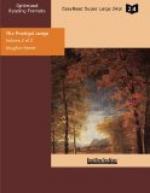“You’re naming our best people, sir, when you name the Malroys and the Nortons; they are pretty much in a class by themselves,” said Mr. Saul, whose awe of the judge was momentarily increasing.
“I don’t underestimate the value of a social endorsement, sir, but I’ve never stood on that,” observed the judge. “I’ve come amongst you unheralded, but I expect you to find me out. Now, sir, if you’ll be good enough, I’ll glance at the record.”
Mr. Saul scrambled up out of the depths of his chair and exerted himself in the judge’s behalf.
“This is what you want, sir. Better take the ledger to the window, the light in here ain’t much.” He drew forward a chair as he spoke, and the judge, seating himself, began to polish his spectacles with great deliberation. He felt that he had reached a crisis in his career, and was disposed to linger over the hope that was springing up in his heart.
“How does the docket for the next term of court stand?” he inquired.
“Pretty fair, sir,” said Mr. Saul.
“Any litigation of unusual interest in prospect?” The judge was fitting his glasses to the generous arch of his nose, a feature which nicely indexed its owner’s habits.
“No, sir, just the ordinary run of cases.”
“I hoped to hear you say different.”
“You’ve set on the bench, sir?” suggested Mr. Saul.
“In one of the eastern counties, but my inclination has never been toward the judiciary. My temperament, sir, is distinctly aggressive—and each one according to the gifts with which God has been graciously pleased to endow him! I am frank to say, however, that my decisions have received their meed of praise from men thoroughly competent to speak on such matters.” He was turning the leaves of the ledger as he spoke. Suddenly the movement of his hand was arrested.
“Found it?” asked Mr. Saul. But the judge gave him no answer; absorbed and aloof he was staring down at the open pages of the book. “Found the entry?” repeated Mr. Saul.
“Eh?—what’s that? No—” he appeared to hesitate. “Who is this man Quintard?” The question cost him an effort, that was plain.
“He’s the owner of a hundred-thousand-acre tract in this and abutting counties,” said Mr. Saul.
The judge continued to stare down at the page.
“Is he a resident of the county?” he asked, at length.
“No, he lives back yonder in North Carolina.”
“A hundred thousand acres!” the judge muttered thoughtfully.
“There or thereabouts—yes, sir.”
“Who has charge of the land?”
“Colonel Fentress; he was old General Ware’s law partner. I’ve heard it was the general who got this man Quintard to make the investment, but that was before my time in these parts.”
The judge lapsed into a heavy, brooding silence.




